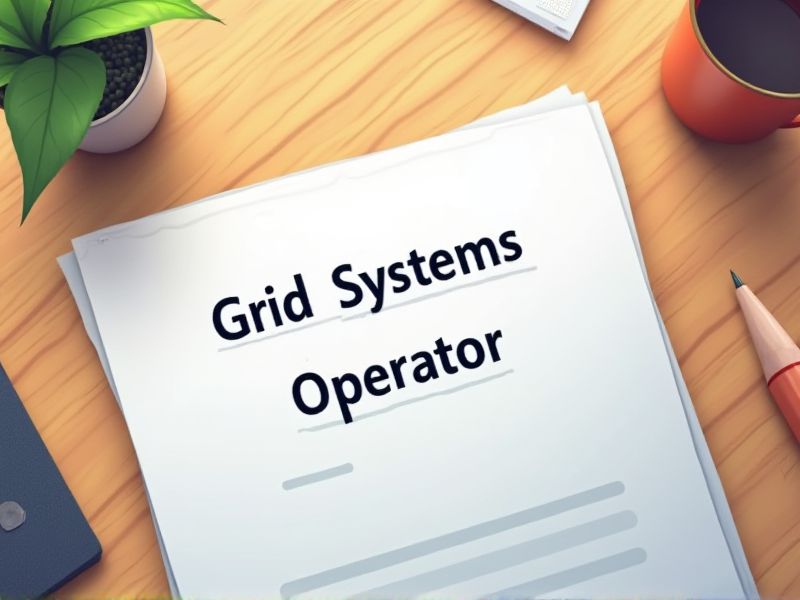
Grid Systems Operators are responsible for the coordination and control of electrical grids, ensuring the stable distribution of electricity. Due to the complexity and importance of their role, they must have a deep understanding of power systems and safety protocols. Certifications help validate their expertise and provide assurance of their capability to handle critical situations. Here are some key certifications that may be required for a Grid Systems Operator.
NERC System Operator Certification
The NERC System Operator Certification is needed to ensure grid systems operators have the necessary knowledge and skills to maintain reliable electricity operations. It establishes a standard of excellence, which reduces the risk of widespread outages. This certification supports compliance with industry regulations, enhancing overall grid security. By certifying operators, the certification promotes confidence among stakeholders in the reliability and resilience of the power grid.
NERC CIP (Critical Infrastructure Protection) Certification
NERC CIP Certification ensures that a Grid Systems Operator maintains compliance with industry standards, which mitigates risks related to cybersecurity threats. This certification promotes the secure and reliable operation of the power grid by setting guidelines for protecting critical assets and sensitive information. By adhering to NERC CIP standards, operators demonstrate a commitment to infrastructure resilience, fostering trust among stakeholders and regulatory bodies. The certification process equips operators with the necessary skills and knowledge to effectively respond to potential security incidents, minimizing potential disruptions to energy supply.
IEEE Certified Power & Energy Professional (CPEP)
Grid systems are complex and require advanced knowledge in power systems to ensure reliability and efficiency. The IEEE Certified Power & Energy Professional (CPEP) certification provides standardized training in energy concepts, making it essential for operators. With this certification, operators gain a thorough understanding of modern grid technologies, improving operational decision-making. Employers value the IEEE CPEP as it signifies a commitment to professional development and technical expertise in energy management.
PJM Grid Operator Training Certification
The PJM Grid Operator Training Certification ensures operators possess the technical knowledge required to manage and respond to the complexities of an increasingly dynamic power grid. This certification equips operators with skills to mitigate risks and optimize grid efficiency, enhancing system reliability. High-demand periods and integration of renewable energies necessitate standardized training, making the certification crucial for consistent grid performance. Regulatory bodies often mandate such certifications to uphold industry standards and ensure adherence to best practices.
Smart Grid Technology Certification
Smart Grid Technology Certification enhances a Grid Systems Operator's ability to effectively manage and integrate renewable energy sources, leading to improved grid reliability. Certification provides operators with the skills to utilize real-time data analytics, essential for optimizing grid performance and reducing outages. With the rise in cybersecurity threats, certified operators possess advanced knowledge to safeguard grid infrastructure against such risks. As the energy sector evolves, this certification ensures operators remain current with technological advancements and regulatory standards.
SCADA Cybersecurity Certification
SCADA cybersecurity certification is needed for grid systems operators as it equips them with the knowledge to safeguard critical infrastructure from cyberattacks, which can disrupt power distribution. The increasing integration of digital solutions in grid systems enhances efficiency but also introduces vulnerabilities that require specialized skills to mitigate. A certified operator can effectively identify and respond to threats, minimizing potential downtime and ensuring consistent service delivery. Regulatory bodies often require certification to meet industry standards, reinforcing the importance of cybersecurity in national infrastructure.
Certified Energy Manager (CEM)
Grid systems require efficient energy management to ensure stability, and a Certified Energy Manager (CEM) brings expertise in optimizing energy usage. The complexity of grid operations demands in-depth knowledge of energy systems, which CEMs possess through rigorous training. CEMs provide critical insights into energy conservation strategies, reducing operational costs and enhancing sustainability. Their proficiency in regulatory compliance ensures that grid operations meet necessary standards, minimizing legal and financial risks.
Power Systems Engineering Certification
Grid Systems Operators manage complex electrical grids, and a Power Systems Engineering Certification ensures they have the requisite expertise. This certification validates their understanding of electrical grid dynamics, stability, and safety protocols, which are critical in preventing outages and ensuring efficiency. The specialized knowledge gained through certification enhances their capability to make informed decisions during grid fluctuations or emergency situations. Certified operators consequently contribute to the reliability and resilience of the energy supply in regional and national grids.
Project Management Professional (PMP)
Grid Systems Operators deal with complex and large-scale projects, and PMP certification ensures they possess the skills to effectively manage such projects. PMP standardizes best practices, which helps Grid Systems Operators streamline processes and improve efficiency. The certification also brings a strong focus on risk management, crucial for maintaining grid stability and reliability. Employers value PMP in this field because it indicates a commitment to professional excellence and continuous learning.
ITIL Foundation Certification
Grid Systems Operators often manage complex IT infrastructures, which necessitates a deep understanding of IT service management principles. ITIL Foundation Certification provides a structured framework for managing IT services and incidents effectively. This certification equips operators with the skills to enhance service delivery and reliability. Consequently, trained operators can minimize downtime and disruptions, optimizing grid performance.
Summary
When you gain certifications as a Grid Systems Operator, your expertise becomes more validated, leading to increased credibility within the industry. This often results in enhanced job opportunities and potential salary increments. Certified operators typically demonstrate improved decision-making capabilities, fostering safer and more efficient grid management. Consequently, companies may experience reduced downtime and better regulatory compliance.
